What Color Shoes to Wear With Blue Suit
The combination of blue & gray is always stylish, while remaining conservative and perfect for the office. In this article, one in a series on classic color combinations, we take a look at the different ways to pair blue and gray.
If you had to choose the most important colors to form the basis of a tailored wardrobe, they would be blue, particularly navy blue, followed closely by gray. These hues not only play well with various other shades but also work beautifully with one another, thus making them the most versatile color pairing in menswear.

Windowpane Suit with Gray Windowpane Tie
How to Wear Blue and Gray
Blue and Gray with a Suit and Tie
The easiest way to coordinate blue and gray is to match the two in a suit and tie combination. It's commonly said that when a man first ventures into the world of tailored clothing–or into the working world that demands such a dress code–he should begin with a navy blue suit. Using a gray tie with this navy suit is a surefire way to earn style points.
The second suit a man should own when starting a business wardrobe is a gray one, but here the recommendations vary between a mid-gray and a charcoal. In either case, you simply take the opposite approach as your first suit and coordinate with a blue tie. The entire range of gray presents a neutral backdrop for any mid – to navy blue tie to work. And, the fact that both blue and gray are cool colors ensures they will pair naturally. Even if your gray suit contains warmer brown tones, you'll have no issues because blue also combines perfectly with brown.

Daniel Craig as James Bond in a mid-gray suit with mid-blue tie.
Avoid Strong Contrast
Although pairing a gray tie with a blue suit and vice versa is nearly foolproof, there are some ways for you to make the most of this combination. For one thing, avoid too strong a contrast between the two colors, which is the general rule for any color coordination. So, if your suit is dark gray, avoid a really pale blue.
Add Pattern and Texture
Beyond avoiding sharp contrast, try adding complexity and interest to your blue and gray combinations by introducing textures and patterns. Sure, you can start simply with a white shirt, solid tie, and a plain worsted wool suit, but this gets boring fast. An easy way to add a pattern while remaining classic is to use a gray glen check tie in silk (or wool for winter) with a navy suit. For a gray suit, get a navy grenadine tie in either a large or fine weave (garza grossa or garzafina) to inject texture. In the reverse scenario, pick up a silver grenadine for a blue suit.
Use Items with Both Colors Together
The most sophisticated method to combine gray and blue with a suit and tie, however, is to choose items that contain both colors together. For example, you can wear a navy suit with a gray windowpane pattern. By definition, Prince of Wales suiting fabric differs from a glen check because it contains an overcheck in an additional color, and a common version of this is a gray base pattern with the addition of a blue overcheck, giving you both in one shot.

An example of Prince of Wales suiting fabric from Sartoria Rossi showing a gray base pattern with blue overplaid.
Printed silk ties with blue and gray geometric patterns or knit ties with both colors in them are likewise excellent options. I especially like the versatility of striped ties with either a repp pattern or large block stripes for this purpose. If you get a tie with stripes of both colors you can wear them easily with either gray or blue suits.
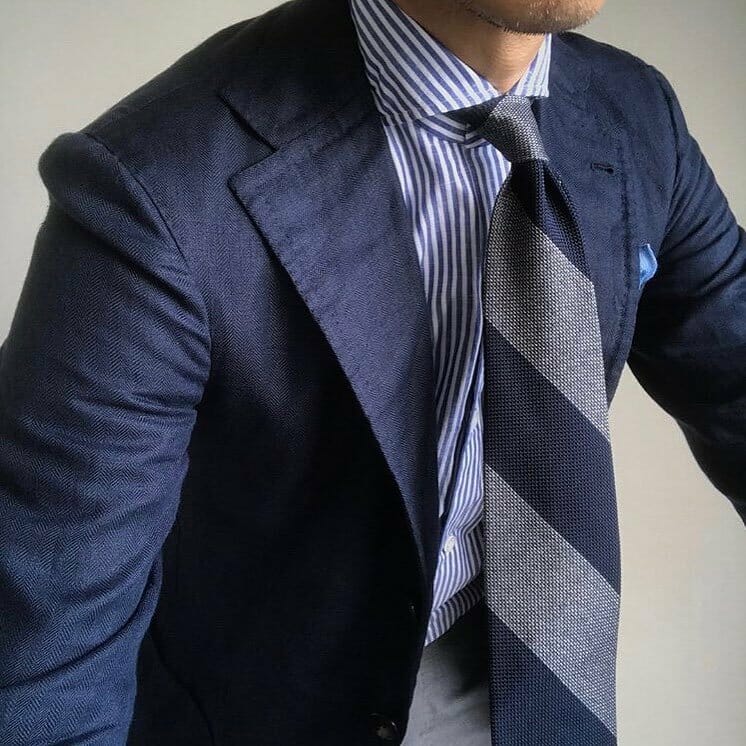
@nfld_rm55 wearing a blue and gray block stripe tie; find a similar one here
Gray and Blue with Odd Combinations
The same techniques mentioned above can be used when wearing sports coat and trouser combinations, though some men may be put off by the perceived difficulties of coordinating an additional article of clothing: pants in a different shade. If you begin with blue and gray, this is actually a piece of cake. Like the navy suit, the navy blazer is a staple, foundational item of menswear. Technically, a solid blazer has to be blue, so begin there and add gray pants.
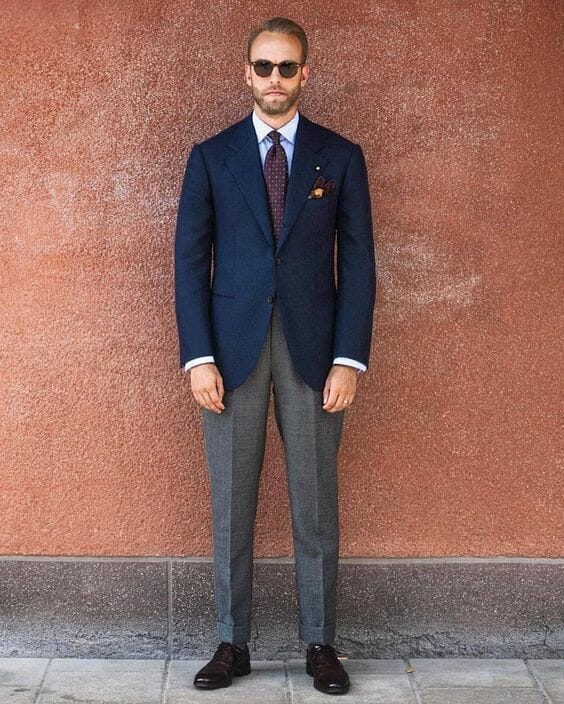
Andreas Weinås doesn't look like a security guard in this combination of navy and gray.
You may have heard that the classic navy jacket and gray trousers will make you look like a security guard, but if you choose an appropriate fit and quality materials that simply won't happen. Just stay away from cheap shoes, polyester fabric, and baggy fits, and you'll be fine. Add a pocket square to the outfit, even a simple white linen one, and there's no way your outfit will be mistaken for a uniform. Wearing a striped shirt or tie that isn't plain, including the aforementioned navy or silver grenadine, will elevate the look as well.
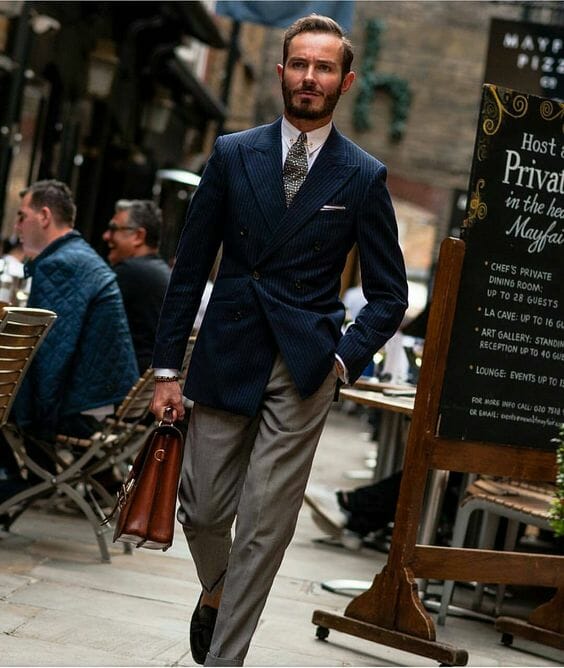
A rich navy blue double-breasted suit jacket with gray trousers
The opposite move–a gray sports coat with navy trousers–is rarer, maybe because it is generally more difficult to pull off a lighter jacket with darker pants. However, there's no reason to be dissuaded, as long as your blue pants don't look like the bottom half of a suit. Here, a pattern can be your friend and using a gray sports coat that contains a pattern, again the classic glen check or Prince of Wales, will enhance your chances of success.

Brian Sacawa of He Spoke Style wearing a glen check gray sports coat and navy blue pants; note how the dark navy knit tie neatly ties the dark pants with the lighter jacket
Multiple Layers of Blue and Gray
Going beyond the basics, you can use the principles in our Layering 101 guide to increase the sophistication of your gray and blue combinations. When we talk about layering we immediately think knitwear and overcoats for colder weather.
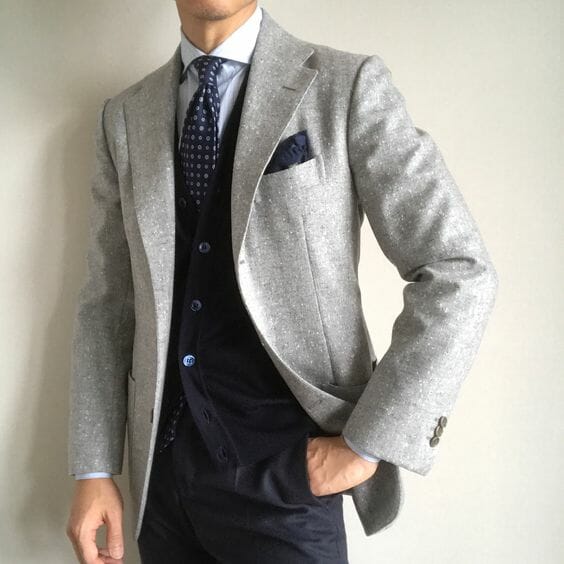
Layering blue and gray items in a single outfit
These provide great opportunities to add either alternating layers of blue and gray hues–like a navy tie, gray sweater vest, and navy jacket–or a swath of the same color–like a navy blue tie, cardigan, and pants under a gray flannel sports coat. You can do the same with a gray or blue overcoat too: decide whether you want to duplicate the underlying color or contrast it, then get creative.
Gray and Blue Accessories
Accessories, including gloves, hats, and scarves, are another great way to use these two colors, and, again, you have two broad options. If you have a gray coat on, you could go monochromatic and select elegant gray cashmere-lined peccary gloves to match tones. Alternatively, go with a contrast and choose a pair of bold petrol blue leather gloves in lamb nappa leather. With a scarf, you may be able to "kill two birds with one stone" by purchasing a double-sided version, like this dark blue and gray one in alpaca from Fort Belvedere, which lets you contrast or blend with a flip of the cloth.
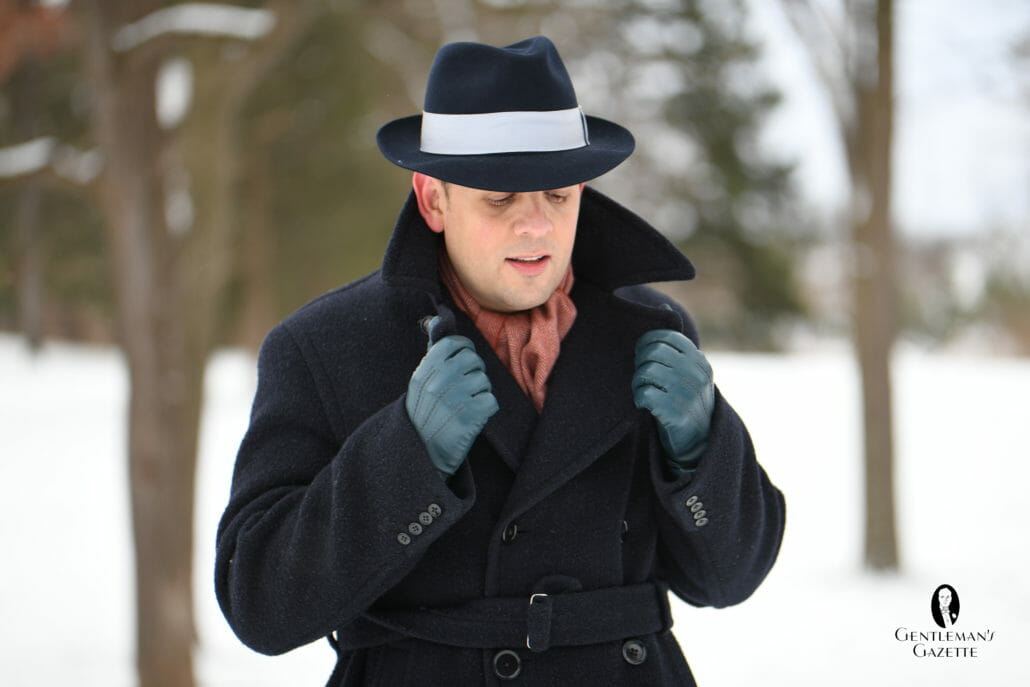
Sven Raphael Schneider looking dapper wearing petrol blue gloves from Fort Belvedere and a navy overcoat
An overlooked accessory that's especially great for warmer weather is a boutonniere. You won't find a gray flower, even in nature, but you can definitely pop a realistic silk blue cornflower boutonniere into the lapel buttonhole of your gray suit jacket to bring on the spring.
Blue and Gray Shoes and Socks
Although blue and gray is usually a conservative combination, one of the boldest things you can do for your overall outfit is to wear these colors as footwear. Dark navy Oxfords are the best choice with a suit since they resemble a standard black business shoe with just a hint of added color, but they are difficult to find. Those with dandy impulses and in a less conservative environment could go with brighter blues, such as a blue wholecut Oxford or monk strap, paired with a light gray suit.
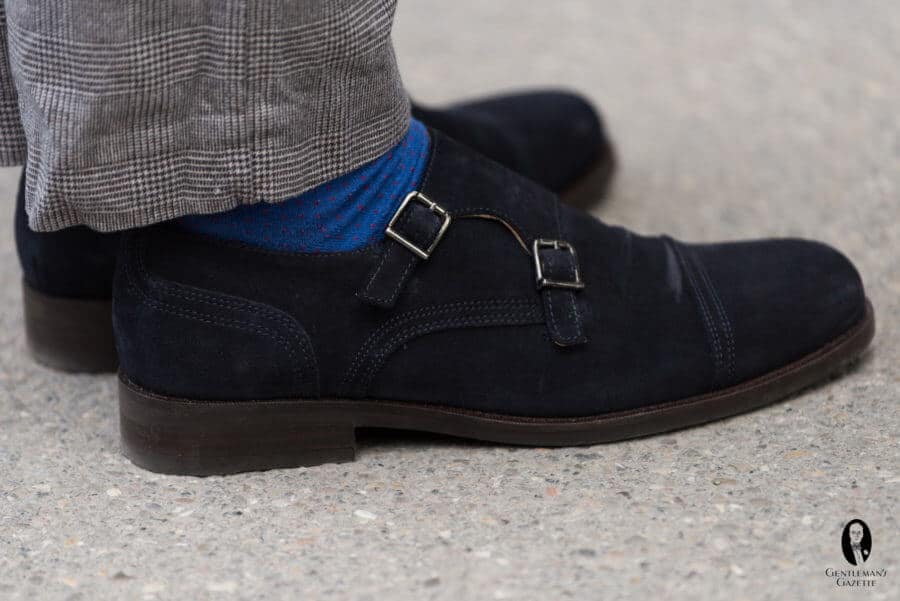
Navy Suede Double Monk Strap shoes
In terms of availability, your best bet for blue shoes might be navy loafers, which are most often found in suede, though polished calf leather makes for a more formal choice, perhaps with gray trousers and a sports coat. Pairing blue shoes of any sort with blue pants are trickier but possible if both colors are similar enough.
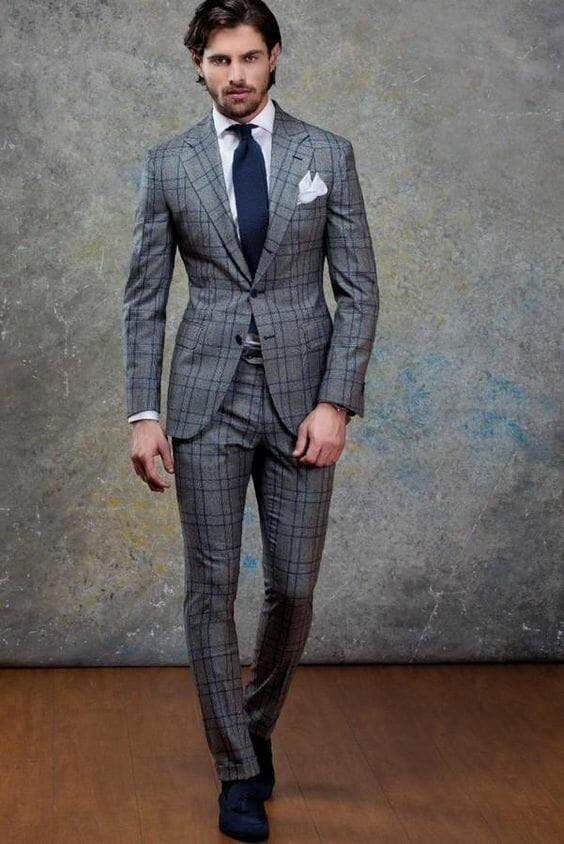
Blue calf leather loafers with navy pants
Those who are truly committed and a bit daring can try to locate spectator shoes that combine both navy and gray. A two-tone shoe is surprisingly versatile because it can accompany tailoring of either color.

Unusual but surprisingly versatile navy and gray brogue wingtips
Solid gray shoes appropriate for tailored clothing are exceedingly rare and tend to be lighter gray monk straps or derbies. Thus, they're awkward for navy trousers due to the high contrast they create, and wearing them with gray could create too much uniformity in your outfit. However, you could always experiment if you find a pair. Something with two tones of gray or just dark gray would be more useful.
If you aren't ready to make the leap to blue or gray shoes, a unique and inexpensive option that will also brighten things up is shoelaces in one of these classic colors. For around $10, you can put gray laces on black oxfords to be worn with a grey suit or blue laces on brown shoes with a navy suit.
Socks are also a terrific option to coordinate blue and gray. As a rule, begin with the principle of matching socks to your pants, not your shoes. You can show some panache by wearing socks that contain the complementary color to your pants (for example, blue socks with gray trousers ) or, better yet, socks that contain both colors, like a light blue and light gray shadow stripe.
Blue and Gray for Casual Wear
Though the Gentleman's Gazette focuses on classic style, we'd be remiss not to mention the most popular article of casual clothing and probably the most popular blue fabric worn throughout the world–denim. We don't specifically think of wearing gray with denim, but maybe we should take this page out of the classic menswear book and apply it to casual wear too. Blue jeans can easily be paired with a gray sports coat, provided the jeans are not overly distressed and the jacket casual enough, like something in an unstructured cotton or with sufficient texture.

Atte Rytkönen from Dress Like A wearing jeans and a gray jacket.
Blue denim shirts have recently become a popular transitional garment, worn instead of dressier shirts with sports coats. Add a navy jacket, gray pants, and the aforementioned blue loafers, and you have a fantastic outfit.
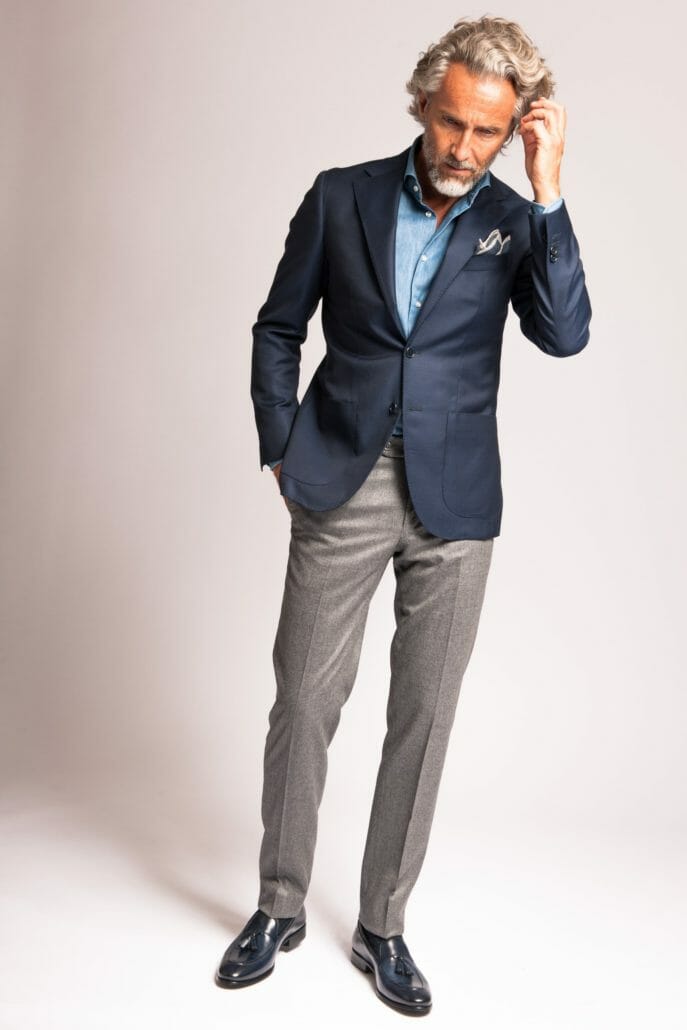
A perfect combination of gray and blue with a denim shirt from Pini Parma.
Conclusion
There's a reason why blue and gray are the base pairing in the DNA of classic men's style, the primary colors to draw upon. Those who are new to color coordination use them as a means of creating fundamentally sound clothing combinations with minimal anxiety, while those who are stylistically advanced return to the pairing as a constant even as they experiment.
How have you used shades of gray and blue? What are your favorite combinations using these two colors? Tell us in the comments below.
What Color Shoes to Wear With Blue Suit
Source: https://www.gentlemansgazette.com/how-wear-blue-gray/